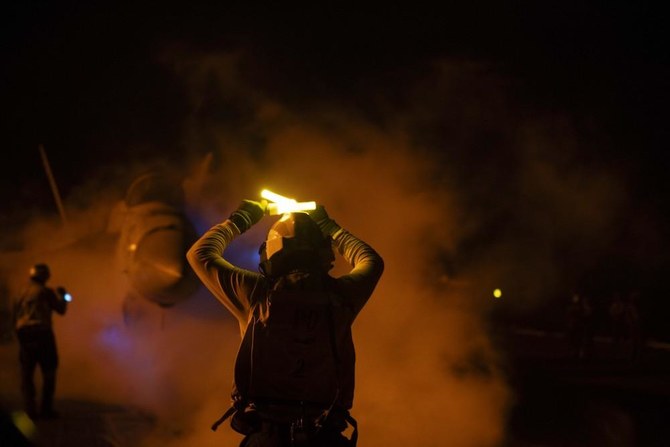DUBAI: The US military unleashed a wave of attacks targeting radar sites operated by Yemen’s Houthi rebels after one merchant sailor went missing and the vessel he was on caught fire in the latest Houthi strike on shipping in the crucial Red Sea corridor, authorities said Saturday.
The attacks come as the US Navy faces the most intense combat it has seen since World War II in trying to counter the Houthi campaign — attacks the rebels say are meant to halt the Israel-Hamas war in the Gaza Strip. However, the Iranian-backed rebel assaults often see the Houthis target ships and sailors who have nothing to do with the war while traffic remains halved through a corridor vital for cargo and energy shipments between Asia, Europe and the Mideast.
US strikes destroyed seven radars within Houthi-controlled territory, the military’s Central Command said. It did not elaborate on how the sites were destroyed and did not immediately respond to questions from The Associated Press.
June 14 U.S. Central Command Update
In the past 24 hours, U.S. Central Command (USCENTCOM) forces successfully destroyed two Houthi uncrewed surface vessels (USV) in the Red Sea.
Additionally, USCENTCOM forces successfully destroyed one uncrewed aerial system (UAS) launched… pic.twitter.com/Mm0mV9EN0i
— U.S. Central Command (@CENTCOM) June 15, 2024
“These radars allow the Houthis to target maritime vessels and endanger commercial shipping,” Central Command said in a statement.
The US separately destroyed two bomb-laden drone boats in the Red Sea, as well as a drone launched by the Houthis over the waterway, it said.
The Houthis, who have held Yemen’s capital, Sanaa, since 2014, did not acknowledge the strikes, nor any military losses. That’s been typical since the US began launching airstrikes targeting the rebels.
The Central Command said one commercial sailor from the Liberian-flagged, Greek-owned bulk cargo carrier Tutor remained missing after an attack Wednesday by the Houthis that used a bomb-carrying drone boat to strike the vessel.
“The crew abandoned ship and were rescued by USS Philippine Sea and partner forces,” Central Command said. The “Tutor remains in the Red Sea and is slowly taking on water.”
The British military’s United Kingdom Maritime Trade Operations center said Saturday afternoon that the Tutor was “still on fire and sinking.”
The missing sailor is Filipino, according to the state-run Philippine News Agency, which cited Migrant Workers Secretary Hans Leo Cacdac. He said most of the Tutor’s 22 mariners were from the Philippines.
“We’re trying to account for the particular seafarer in the ship and are praying that we could find him,” he said Friday night.
Also on Saturday, Central Command said the vessel M/V Anna Meta rescued crew members from the cargo carrier M/V Verbena, which was struck Thursday in the Gulf of Aden off the coast of Yemen in two separate missile attacks by the Houthis.
The crew abandoned ship after being unable to bring fires on the vessel under control. One mariner was severely wounded.
CENTCOM said the Verbena is a Palauan-flagged, Ukrainian-owned and Polish-operated bulk cargo carrier that had docked in Malaysia and was on its way to Italy carrying wood.
The Houthis have launched more than 50 attacks on shipping, killed three sailors, seized one vessel and sunk another since November, according to the US Maritime Administration. A US-led airstrike campaign has targeted the Houthis since January, with a series of strikes May 30 killing at least 16 people and wounding 42 others, the rebels say.
The war in the Gaza Strip has killed more than 37,000 Palestinians there, according to Gaza health officials, while hundreds of others have been killed in Israeli operations in the West Bank. It began after Hamas-led militants attacked Israel on Oct. 7, killing about 1,200 people and taking around 250 hostage.
“The Houthis claim to be acting on behalf of Palestinians in Gaza and yet they are targeting and threatening the lives of third-country nationals who have nothing to do with the conflict in Gaza,” Central Command said. “The ongoing threat to international commerce caused by the Houthis in fact makes it harder to deliver badly needed assistance to the people of Yemen as well as Gaza.”






















